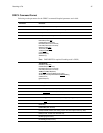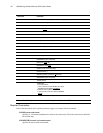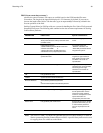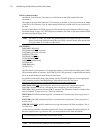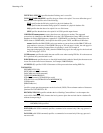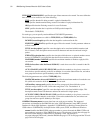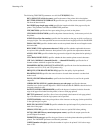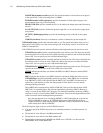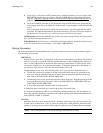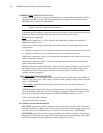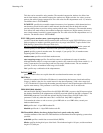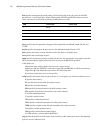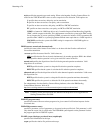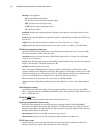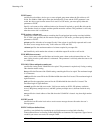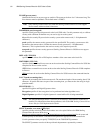
Receiving a File 55
If you receive a file from an ASCII platform using extended translation, you must specify in the
FMSYSOPTS that the data type is binary. Refer to the IBM Sterling Connect:Direct Processes
Web site at http://www.sterlingcommerce.com/documentation/processes/processhome.html
for
platform-specific SYSOPTS parameters.
If you receive DBCS data from an ASCII platform using the XTRAN keyword, ensure that the
record length of the file on the i5/OS side of the transfer is large enough to contain the translated
record.
The record length of the file on the i5/OS side of the transfer is generally larger than the ASCII
equivalent. For additional information, refer to the Maintaining Extended Translation chapter of
the IBM Sterling Connect:Direct for i5/OS Installation and Administration Guide
CCSID(nnnnn) specifies the coded character set ID to use when creating IFS files. If no character set
ID is specified, the system default is used.
EORCHAR(xxxx) specifies the two-to four-digit hexadecimal symbol to identify the character to use
in text files as the end-of-record character, for example, EORCHAR(0A).
Optional Parameters
The following parameters, listed alphabetically, are optional. Unless otherwise noted, the parameters apply to
all remote node environments.
CKPTINV(n)
Number of bytes, from 1K to 2 gigabytes, to send or receive before taking a checkpoint. The format is
nnnnnnn, nnnnnnK, or nnnnnnM, where K specifies thousands of bytes and M specifies millions of
bytes. A value of 0 specifies no checkpoint restart Sterling Connect:Direct for i5/OS uses the value
you specify, rounded up to the nearest record boundary, to determine when to take a checkpoint. If
you specify a value between 1 and 1023, the value becomes 1024 or 1K.
Checkpointing does not occur in the following cases, even if you specify a checkpoint interval:
The file being received is compressed by the remote node during the receive operation by the
local node using the extended compression feature but is not being decompressed on the local
node. That is, the TOSYSOPTS has DECMPR(*NO).
The file being received was precompressed on the remote node and is being decompressed on the
local node during the receive operation. That is, the FMSYSOPTS has PRECMPR(*YES) and
TOSYSOPTS has DECMPR(*YES).
A single z/OS partitioned data set member is being received.
A checkpoint interval specified here overrides the system-wide default value.
If you request checkpointing when you are transferring multiple members of a file, checkpoints are
taken only at member boundaries regardless of the interval specified in the initialization parameters or
in the CDSND or CDRCV command.
CLASS(n)
determines the node-to-node session on which a Sterling Connect:Direct operation can execute. The
CLASS can be a number from 1–255. If you do not specify the CLASS parameter, it defaults to the
number of maximum sessions defined in the mode description for the communications environment.
Note: The CLASS parameter is not used by Sterling Connect:Direct for i5/OS.



